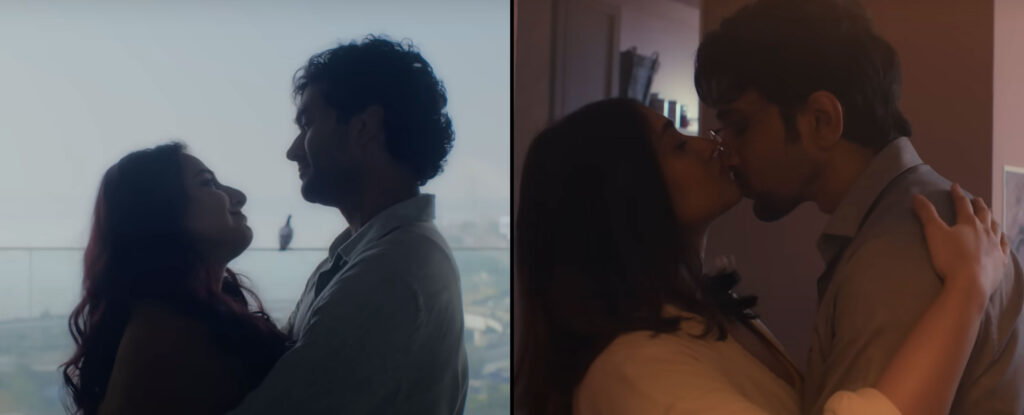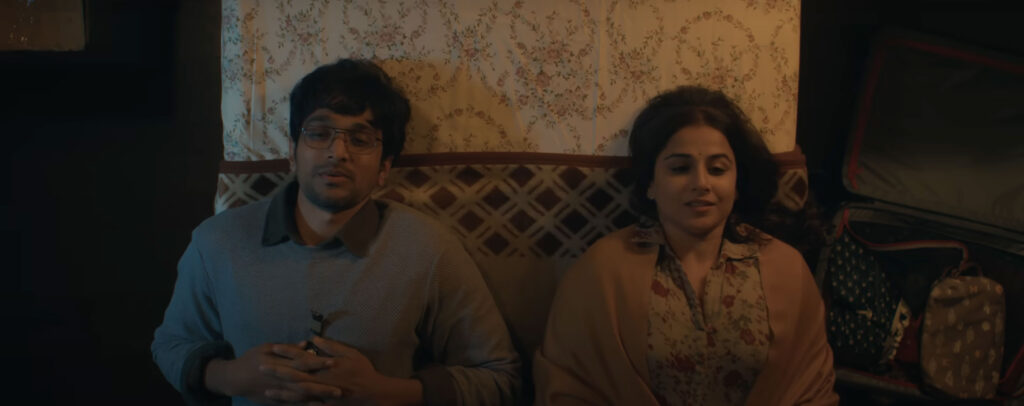comedy, Do Aur Do Pyaar, drama, Hitha Chandrashekhar, movies, Pratik Gandhi, Rekha Kudligi, reviews, Sendhil Ramamurthy, Shirsha Guha Thakurta, Thalaivasal Vijay, Vidya Balan
April 23, 2024
by Carla Hay

Directed by Shirsha Guha Thakurta
Hindi and Tamil with subtitles
Culture Representation: Taking place in the Indian cities of Mumbai and Ooty, the dramatic film “Do Aur Do Pyaar” (a remake of the 2017 movie “The Lovers”) features an all-Asian cast of characters representing the working-class and middle-class.
Culture Clash: A husband and a wife—who are bored with each other and are contemplating divorce after 12 years of marriage—each has a lover, but then the spouses rekindle the passion in their marriage, which makes their lovers jealous and suspicious.
Culture Audience: “Do Aur Do Pyaar” will appeal primarily to people who are fans of the movie’s headliners and romantic dramedies that have realistic depictions of messy relationships among adults.

“Do Aur Do Pyaar” is a mature and non-judgmental look at a husband and a wife who each has a lover outside the marriage. This emotionally complex remake of 2017’s “The Lovers” has more drama than comedy and admirably does not have a stale, formulaic plot. However, with a total running time of 137 minutes, “Do Aur Do Pyaar” is a little too long for what the movie ultimately shows what happens to the story’s entangled relationships by the end of the film.
Shirsha Guha Thakurta makes her feature-film directorial debut with “Do Aur Do Pyaar,” which has an adapted screenplay written by Suprotim Sengupta, Amrita Bagchi and Eisha Chopra. Thankfully, “Do Aur Do Pyaar” (which means “two plus two is love” in Hindi) is not a complete copy of the American movie “The Lovers”—the overall concept is the same, but many of the elements for the plot and characters are very different. “Do Aur Do Pyaar” takes place mostly in Mumbai (where a few of the characters still refer to the city as Bombay) and partially in Ooty, India.
In “Do Aur Do Pyaar,” the married couple are Kavya Ganeshan (played by Vidya Balan) and her husband Anirudh “Ani” Banerjee (played by Pratik Gandhi), who are both 38 years old and have been married for 12 years. Kavya is a dentist who thinks of herself as a strong and opinionated independent woman. Ani, who works at a cork factory, is the more passive partner in this marriage.
The movie has some flashbacks, but most of the story goes back and forth between showing the present-day relationships between Kavya and Ani and their extramarital lovers. Kavya and Ani have lost a lot of love for each other because they were never that passionately in love in the first place. They seemed to have a “friends with benefits” relationship that turned into marriage when Kavya proposed to Ani, who accepted the marriage proposal because Kavya’s job as a dentist had financial security. Kavya and Ani eloped, which has repercussions for Kavya later in the story.
Before Kavya and Ani got married, Ani was dating an aspiring actress named Nora (played by Ileana D’Cruz), and they continued to see each other after Ani got married. However, Nora has become very impatient because she thinks Ani is long overdue to get a divorce and fully commit to Nora. Even though they all live in Mumbai, Nora has not met Kavya in person when the story begins. For much of the story, Kavya does not know about Nora, who uses the alias Rosie, the name of a ghost character that Nora auditioned for in an acting job.
Kavya’s lover is an international photographer named Vikram, nicknamed Vik (played by Sendhil Ramamurthy), who is of Indian heritage but he grew up in the United States. Vikram used to live in New York City, but he moved to Mumbai to be closer to Kavya, who is often called Kavs by Ani and Vikram. Vikram is very much in love with Kavya and knows that Kavya is married.
Because Vikram’s job requires him to do a lot of traveling, it’s been easier for Kavya to keep her extramarital affair separate from her marriage than Ani has been able to keep his affair separate from his marriage. Still, Vikram is also showing signs that he wants Kavya to eventually choose between him or Ani. Kavya has been able to keep her affair a secret from Ani.
Kavya told Ani before they got married that she does not want to have children. It’s mentioned at one point in the movie that Kavya had an abortion during the marriage, and Ani knows about the abortion. However, there’s a scene later in the movie when Ani seems to doubt his decision to not become a parent, even though he knows Kavya won’t change her mind about not having children. As already shown in the trailers for “Do Aur Do Pyaar,” Nora (who is about five or six years younger than Kavya) has an argument with Ani when she blurts out that she thinks she might be pregnant.
In “The Lovers,” Tracy Letts and Debra Winger portray the unhappily married husband and wife who have lovers outside the marriage. In “The Lovers,” much of the plot is about the spouses getting a visit from their adult son and the son’s girlfriend. It’s a tension-filled visit because the son knows that his parents’ marriage is falling apart, but he is surprised to see during the visit that his parents are actually affectionate with each other. Meanwhile, the lovers of the spouses become increasingly insecure.
In “Do Aur Do Pyaar,” the drama from outside relatives comes from Kavya’s Ooty-based family, which is the only family shown in the movie. Kavya has “daddy issues” with her domineering father Venkat (played by Thalaivasal Vijay), who doesn’t approve of the marriage, for various reasons, including because Venkat thinks that Ani’s caste is “beneath” Kavya’s caste. Venkat is still angry that Kavya and Ani eloped before Venkat had a chance to meet Ani. Kavya’s mother Savitri (played by Rekha Kudligi) doesn’t say much and tries to keep the peace when Kavya and Venkat argue with each other.
When the father of Venkat dies, Kavya and Ani apprehensively go to Ooty for the funeral. At this point, Kayva had already visited a divorce lawyer in Mumbai, and Kavya was ready to serve divorce papers to Ani. However, they both agree to pretend to her family that Kavya and Ani have a happy marriage. There are various aunts, uncles and cousins at the funeral, but they do not any real bearing on the overall plot. The only family member who has a significant role is Kavya’s father Venkat.
Kavya and Ani feel like outsiders in the family, which creates a bond between Ani and Kavya and rekindles their passion for each other. They start having sex again. (The sex scenes in the movie are very tame, and there is no nudity.) Ani and Kavya also become friends again, after a long period of time of treating each other like barely tolerated roommates.
Naturally, Kavya and Ani have to navigate how this unexpected change in their marriage will affect the relationships they have with their respective lovers. Kavya and Ani now feel like they’re “cheating” on their lovers, who are both under the impression that Kavya and Ani will soon start divorce proceedings. As Kavya and Ani make excuses not to end the marriage, their lovers get jealous and start raising the stakes in these love entanglements.
Kavya (who can be demanding and hypocritical) could easily have been the movie’s biggest “villain,” if she had been written or performed a different way. However, there are no “villains” in this story—just people caught up in love relationships that confuse them when feelings change over time. “Do Aur Do Pyaar” also authentically shows that what people want out of love, marriage and other relationships can start out one way and end up a different way, based on a variety of circumstances.
Kavya represents the type of woman who wants to be liberated from conventional ideas of how a wife should be but she also wants to be loved on her own terms. She struggles with this often-difficult balance in her personal life. As someone who is a high achiever and craves her father’s approval the most, Kavya has some deep-seated issues that have nothing to do with Ani. Because Kavya is the only character who is shown to have a family, she is the only character where viewers get a sense that having a failed marriage will be a big stigma for Kavya in her family.
Thanks to Balan’s standout performance, the movie is able to show the nuances of these two love triangles in ways that do not reduce Kavya to being the “shrew wife.” Neither is Nora a stereotype of a “homewrecking mistress.” Ani and Vikram are also not Lotharios who callously use women as sexual conquests. In fact, in “Do Aur Do Pyaar,” the men make considerable efforts to be sincerely romantic to their partners. Kavya is actually the most selfish one out of all four of these lovers.
One of the best things about “Do Aur Do Pyaar” is that it shows how important timing is when it comes to having healthy love relationships that last and how feelings for a lover can run hot, cold or somewhere in between, depending on the people and circumstances. The movie doesn’t need to lecture about the damaging consequences of lying and cheating in relationships, because guilt also has an effect on people who secretly do things to harm the people who are close to them. The movie pokes some fun at the absurd lengths that some people will go to in hiding an extramarital affair.
Unfortunately, “Do Aur Do Pyaar” falls very short in telling or showing viewers anything about the backstories for Ani, Nora and Vikram. Gandhi as Ani does a very good job of balancing comedy and drama in his performance, but very little or nothing is told about his family or relationship history. D’Cruz and Ramamurthy are stuck playing underdeveloped characters and can only do so much with these limitations. Vikram in particular is a character where almost nothing substantial is revealed about him from the beginning to the end of the movie.
The movie could have done more to show that Kavya, Ani, Nora and Vikram have friends. And only Kavya is shown interacting with a co-worker who has a name in the movie. There’s an amusing scene where Kavya and her co-worker Lata (played by Hitha Chandrashekhar) clean a female patient’s teeth while talking to each other about sex and using the term “hit the jackpot” instead of saying “have an orgasm.” At other times, some of the movie’s dialogue resembles a very trite soap opera. For example, in the last third of the film, Vikram has an emotional monologue that is utterly cliché.
Despite some of the movie’s flaws, “Do Aur Do Pyaar” should keep most viewers interested in finding out what will happen to the tangled relationships in the story. The movie is most accurate in showing how these situations do not always have easy solutions, and people cannot just turn off emotions like a faucet. As it stands, “Do Aur Do Pyaar” is a worthy watch for people who want to see adult relationships portrayed in ways that are closer to real life than the trite and often-unrealistic scenarios that are in most movies about romance.
AA Films released “Do Aur Do Pyaar” in select U.S. and in India on April 19, 2024.
